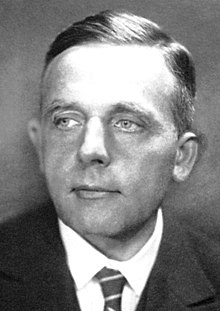Otto Heinrich Warburg
German physiologist, medical doctor and Nobel laureate (1883–1970) From Wikipedia, the free encyclopedia
Otto Heinrich Warburg (October 8, 1883 - August 1, 1970) was a German chemist.[3] After earning his doctorate degrees in medicine and chemistry, he started to investigate how oxygen is consumed by cells in a living organism. His studies led him to identify the role of the cytochromes.[4]
Otto Heinrich Warburg | |
|---|---|
 Otto Heinrich Warburg | |
| Born | 8 October 1883 |
| Died | 1 August 1970 (aged 86) |
| Alma mater | University of Berlin University of Heidelberg |
| Known for | Oncometabolism Warburg hypothesis Warburg effect (oncology) Warburg effect (plant physiology) Warburg–Christian method |
| Awards | Iron Cross 1st class (1918) Nobel Prize in Physiology or Medicine (1931)[1] Pour le Mérite (Civil Class) (1952) Paul Ehrlich and Ludwig Darmstaedter Prize (1962) Foreign Member of the Royal Society[2] |
| Scientific career | |
| Fields | Cell biology |
| Institutions | Kaiser Wilhelm Institute for Biology |
| Doctoral advisor | Emil Fischer Ludolf von Krehl |
He won the 1931 Nobel Prize in Physiology or Medicine for the discovery of the respiratory enzyme.
Cancer
In the 1920s, Warburg and his colleagues observed that tumors take up higher amounts of glucose than their surrounding tissues. Although consuming glucose is helpful for mammals because it is a nutrient, tumor cells consume too much glucose despite having working mitochondria and enough presence of oxygen. This observation is called the Warburg effect.[5]
Following this observation, Warburg and his colleagues concluded: that to kill a tumor cell, it must be deprived of glucose.[5]
Private life
References
Other websites
Wikiwand - on
Seamless Wikipedia browsing. On steroids.
